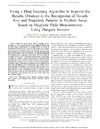Identificador persistente para citar o vincular este elemento:
https://accedacris.ulpgc.es/jspui/handle/10553/77790
| Título: | Using a Deep Learning Algorithm to Improve the Results Obtained in the Recognition of Vessels Size and Trajectory Patterns in Shallow Areas Based on Magnetic Field Measurements Using Fluxgate Sensors | Autores/as: | Perez, Marina Parras, Juan Zazo, Santiago Pérez Álvarez, Iván Alejandro Sanz Lluch, María del Mar |
Clasificación UNESCO: | 3308 Ingeniería y tecnología del medio ambiente | Palabras clave: | Magnetic sensors Fluxgate Magnetic simulations Vessels Deep learning, et al. |
Fecha de publicación: | 2022 | Proyectos: | Controlando Las Redes de Comunicaciones Electromagneticas Submarinas Mediante Despliegues Autoconfigurables. Subproyecto UPM. | Publicación seriada: | IEEE Transactions on Intelligent Transportation Systems | Resumen: | Safety in coastal areas such as beaches, ports, pontoons, etc., is a current problem with a difficult solution and on which many organizations are putting efforts in terms of technological innovation. In this work the design of a possible solution based on magnetic sensors is presented. First, a study has been made of the type of sensors that best suit the application based on parameters such as sensitivity, the allowed bandwidth of excitation, price or physical construction. Then the system of excitation of the sensors and signal measurement is presented. To justify the design, a series of simulations of magnetic field variations have been carried out in the presence of large objects of conductive material, in the vicinity of the measuring points. With these data a mathematical model has been established that allows the identification of the dimensions and position of the object through triangulation and knowing only the data of the magnetic field. It was found that although this method seems quite effective, it has a significant error, so another method based on neural networks was developed also using data from the simulations. This method seems to yield much better and more reliable results | URI: | https://accedacris.ulpgc.es/handle/10553/77790 | ISSN: | 1524-9050 | DOI: | 10.1109/TITS.2020.3036906 | Fuente: | IEEE Transactions on Intelligent Transportation Systems [ISSN 1524-9050], v. 23(4), p. 3472 - 3481 |
| Colección: | Artículos |
Citas de WEB OF SCIENCETM
Citations
7
actualizado el 25-ene-2026
Visitas
364
actualizado el 15-ene-2026
Descargas
326
actualizado el 15-ene-2026
Google ScholarTM
Verifica
Altmetric
Comparte
Exporta metadatos
Los elementos en ULPGC accedaCRIS están protegidos por derechos de autor con todos los derechos reservados, a menos que se indique lo contrario.
